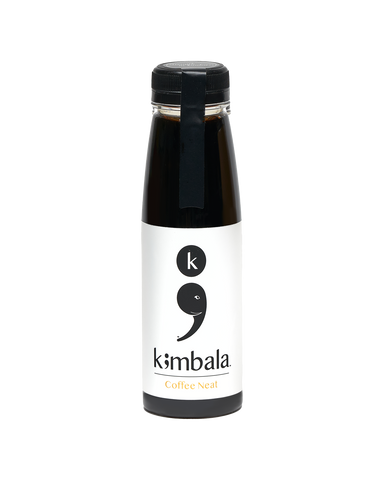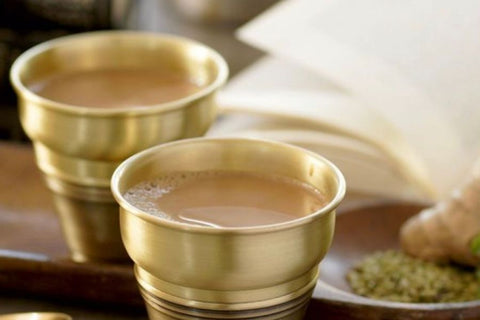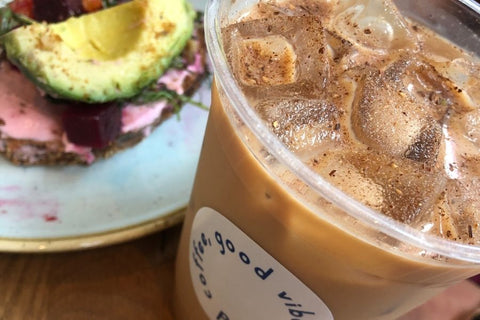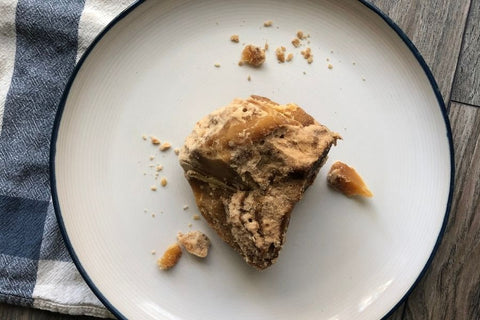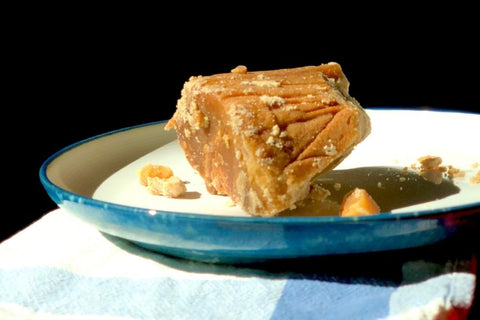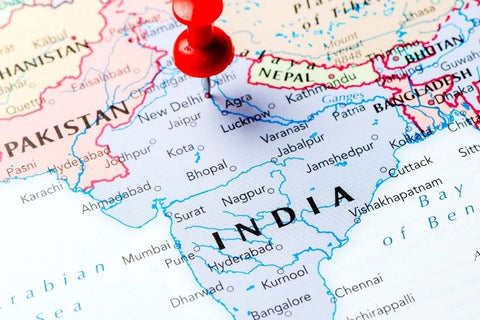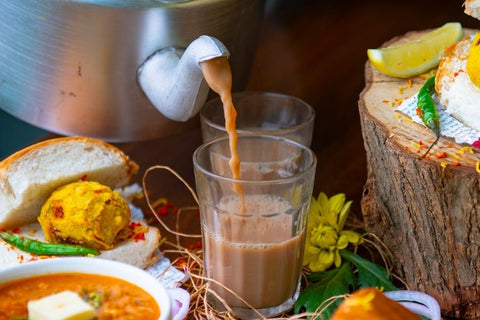Tags:
chai
Chai Concentrate
Tea
Have you ever experienced a chai that just tasted...well, not like chai? We’ve been there. You may have found that your chai–perhaps an order placed at your local coffee shop or a chai concentrate you purchased to mix at home–never seems to be consistent and is more often over-sweetened or way too spiced. It’s hard to know how your chai will taste, and hard to know what a proper chai should taste like if you aren’t familiar with traditionally brewed chai at home. You’ve likely found that it varies from shop to shop, and you may have even given up on ordering it by now.
You’re not alone! Chai can vary broadly from one shop to another; some shops brew their own, some use one of the many mass market concentrates, and others may use a small local brand that is not well known. What can be said about most chai options offered in North America, regardless of whether you’re ordering from a shop or purchasing a supposed "best chai tea concentrate" for home mixing, the flavor profile will likely be void of real tea flavor. The majority, if not all, will be overly spiced and overly sweet. This isn’t a bad thing depending on what your preference is; however, if you’re seeking an authentic chai or you’re looking to try a healthier, clean caffeine beverage with the added bonus of convenience, you likely won’t find this at your local coffee shop.
In sum, our passion for brewing chai runs deep. Our mission is to provide chai lovers and those new to chai with the facts about chai concentrates and chai beverages ordered in-store, in order to leave you feeling empowered to choose your perfect chai. Whether you like a little extra sugar, or you’re all about that bold yet balanced tea flavor.
REMINDER: If you’re looking for a true chai and they call it "chai tea," order a coffee
When you are looking for a nice cup of chai at your local coffee shop or exploring "best chai tea concentrates" to order online or in-store, always adhere to this rule: If they call it “chai tea” it is probably not going to be an authentic chai.
This is your friendly chai pro reminder that saying ‘chai tea’, is not correct. The word ‘chai’ literally means ‘tea’ in the Hindi language - therefore, ‘chai tea’ translates to ‘tea tea’! Saying ‘chai tea’ would be like ordering a ‘cappuccino coffee’ - sounds a little out of place, right?! Chai has its roots in India and you will never hear the phrase ‘chai tea’ uttered there. Can you agree to change your ways and call it chai? Great! If not, we love you all the same and invite you to check out our Complete Guide to Chai to learn more.
Where did the saying ‘chai tea’ come from if it is incorrect?
Whereas asking for a chai in India is understood without explanation as a beverage composed of tea, milk, spices, and sugar, this was not the case in America as the beverage made its way over. Marketers and even major brands started to use ‘chai tea’ on their packaging, websites, etc many years ago as a way to help explain what a consumer would be receiving, tea, and put to the wayside the technical fact that it is an improper term for the most beloved beverage of India.
Eliminating the use of ‘chai tea’ in America may not be entirely possible but having an understanding of how it began and why you should focus on saying ‘chai’, is a good place to start.
Must-Have Components of Chai
Different regions and communities of India have developed chai recipes based on spice availability and their own unique tastes and preferences. A single, absolute, end all be all recipe for chai doesn’t exist. However, at the core of chai there are (4) main components that will be present:
- TEA: Black tea leaves are most commonly used for chai and rooibos may be used for a caffeine free chai.
- SPICES: Also referred to as “masalas” which means spices, the most traditional and readily available in India are cinnamon, cardamom, clove, black pepper, and ginger.
- MILK: Whole milk is most commonly used in India but here in the US, chai made with any dairy alternative is also wonderful!
- SUGAR: Most US chai concentrates will be made with granulated sugar or raw cane sugar.**
A harmonious balance between the tea, spices, sugar and milk should exist - this is what will create a smooth and delicious end product. Not all chai concentrates in the market are created equal, but it all depends on what you're looking for when it comes to choosing your chai.
Chai Concentrate Spectrum: Finding a Balance in Sugar, Spice, & Everything Nice
When evaluating what type of chai is most to your liking, there are (3) factors to consider: amount of sweetness, the presence of a blend of spices, and whether or not you can taste the tea.
Tasting the Tea
Chai is afterall, tea but many chai concentrate options out there seem to focus more on the spices and sugar and less on designing the concentrate to taste like tea. There is a brewing process for concentrates and the black tea being used should be celebrated! The tea should be present and mingling casually with the spices and sweetness, not completely overwhelmed by the other ingredients.
Spices
Loaded with cinnamon or loaded with ginger seems to be the trend with most chai concentrates in the market, but is either truly enjoyable?? Do we really want a sugary chai syrup mixed with milk?? When we talk about “spice” in chai, it doesn’t refer to a ‘burn your mouth’ type of spice or even heat. Spice in chai means using raw, whole spices of clove, cardamom, nutmeg, and cinnamon that yield a subtle but delightful flavor that is balanced but not overpowering. Adding ginger is great for the gut but can also elevate the temperature in your body.
Sweetness
Proceed with caution when it comes to chai concentrates out there. Many are unnecessarily loaded with sugar, which overtakes the tea, can overtake the spices, and ultimately leave you feeling like you’re drinking cinnamon/sugar milk! Everyone loves a good horchata but this flavor profile should not be synonymous with the beloved chai latte. Let’s not forget sugar should be consumed in moderation, and why spend your daily intake all in one overloaded beverage?!
Using the above metrics, a number of the major player chai concentrates have been evaluated and placed on a chai spectrum. Take a peek at the spectrum and we will break it down a bit more after you browse the chart:

The Chai Rating System Explained
Let’s look a bit more into each of the players, their location on the spectrum and explain the tasting notes behind each. Using a scale of 1-5, here is how each number is interpreted:
1 = Little to no tea taste/sweetness/spice
2 = Mild tea taste/sweetness/spice
3 = Balanced tea taste/sweetness/spice
4 = Overpowering tea taste/sweetness/spice
5 = Way too overpowering tea taste/sweetness/spice
 Starbucks // Chai Tea Latte (21g sugar per 8oz drink) Sweetness = 4 - overpowering Spice = 2 - mild Tea = 1 - little to none Sweetness dominates with mild cinnamon flavor, there is no tea taste. This flavor profile is a cinnamon sugar milk. |
|
|
 Oregon Chai // Chai Tea Latte Concentrate (20g sugar per 8oz drink) Sweetness = 5 - way too overpowering Spice = 4 - overpowering Tea = 0 - doesn't exist Cinnamon and sugar are the dominant flavors of this concentrate and there is no taste of tea present at all; this would be the cinnamon and sugar milk flavor profile. |
 Rishi Tea // Masala Chai Concentrate (18g sugar per 8oz drink) Sweetness = 4 - overpowering Spice = 4 - overpowering Tea = 1 - little to none Sweetness is more in line with the spices here but the ginger by far overtakes the other spices used and there is little tea flavor to be found; no balance, plus overpowering spice/sweet. |
 Tazo // Classic Chai Latte Concentrate (16g sugar per 8oz drink) Sweetness = 4 - overpowering Spice = 4 - overpowering Tea = 1 - little to none Overpowering sugar and ginger with no other spice flavors present and any little taste of tea there may have been, is overtaken. |
 The Chai Box // Chai Concentrate (Nutrition Info Not Found) Sweetness = 2 - mild Spice = 3 - balanced Tea = 3 - balanced Mild sweetness, the spices come through nicely (cardamom, clove, cinnamon), the tea taste exists and is in balance with the spices and sweet. |
 Dona // Masala Chai Concentrate (10g sugar per 8oz drink) Sweetness = 4 - overpowering Spice = 2 to 3 - mild to balanced Tea = 1 - little to none The taste of any spice besides cinnamon is very mild and is ultimately overpowered by sweetness with little to no taste of tea. The elements of a chai are present but not in proper balance. |
 Kimbala // Chai Concentrate (12g sugar per 8oz drink) Sweetness = 2 - mild Spice = 3 - balanced Tea = 3 - balanced Tea taste and spices (cardamom, nutmeg, cinnamon) are the stars and nicely balanced; the sweetness is mild but present, and enjoyable. |
Which is your perfect chai?
If sugary beverages are your preference, rest assured there are many chai concentrate options out there to satisfy your taste buds but keep in mind, these options are not an accurate representation of chai. If a more balanced approach to chai is your preference, there are also options and you will be provided a simple and convenient way to enjoy a fresh made chai.
True chai is about the taste of the tea and a balance of raw spices and sweetness. True chai should be as close to made to order as possible and not filled with preservatives, stabilizers, and powdered ingredients.
There are many ways to make chai in India, each with balance, its own originality, and flavor. And while there are also many chai concentrates available in the United States, many are lacking any sort of balance and they are not all an accurate representation of chai. Chai, even in concentrate form, should be filled with wholesome ingredients and the tea should be highlighted.
You deserve fresh and made to order - find small-batch made chai concentrate, like Kimbala chai concentrate, and enjoy consistent, convenient quality and freshness of a homemade chai.
---

Note from the Author: Hi! I’m Andrea and so happy to have you checking out Kimbala and this blog post. I’ve spent 15 years in Food & Beverage across positions, up to a Director level, in luxury Hotels and upscale restaurants. Many years of contributing feedback in tastings for food items, desserts, wines, cocktails, tea, and coffee has developed not only my deep appreciation for quality food & drink but also my palate and ability to objectively taste and evaluate a food or beverage item with a customer perspective in mind. I enjoy full bodied flavors, aromas, mild sweetness and a balanced experience when it comes to food & drink. While the tasting notes are my opinion, it is my hope you appreciate my perspective and trust I provide feedback with a desire to help guide you to selecting the best quality product that also fits your preferences and tastes. Cheers to chai and everything this beautiful beverage has to offer.


